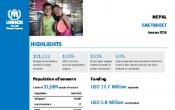Nepal
Operation: Nepal
Location
{"longitude":84,"latitude":28,"zoom_level":0}
Latest update of camps and office locations 21 Nov 2016. By clicking on the icons on the map, additional information is displayed.
Key Figures
| 2017 planning figures | |
| 70 | peaceful coexistence projects will be implemented (refugees from Bhutan) |
| 100% | of households will have access to sustainable energy (refugees from Bhutan) |
| 100% | of primary school-aged children will be enrolled in primary education (refugees from Bhutan) |
| 100% | of people of concern will have access to primary health care (urban refugees) |
| 100% | of primary school-aged children will be enrolled in primary education (urban refugees) |
| 2015 end-year results | |
| 6,560 | refugees departed for resettlement |
| 93% | of primary school-aged urban refugee children were enrolled in primary schools |
| 87% | of primary school-aged children in the camps were enrolled in primary education |
| 48% | female representation in camp committees |
| 41,575 | emergency shelters were provided |
Latest Updates
People of Concern
15%
Decrease in
2015
2015
| 2015 | 33,068 |
| 2014 | 39,012 |
| 2013 | 46,966 |

[["Refugees",32667],["Asylum-seekers",17],["Others of concern",384]]
Loading ...
Budgets and Expenditure for Nepal
< Back
2015
{"categories":[2012,2013,2014,2015,2016,2017],"budget":[15.71760932,15.57919069,15.39627806,17.779095363,9.69132496,7.910130781],"expenditure":[10.68684716,8.69587504,7.64923815,10.25849726,null,null]}
{"categories":[2012,2013,2014,2015,2016,2017],"p1":[12.95508878,9.91735539,10.13508763,9.528128665,9.01183726,7.421662811],"p2":[1.35141954,1.40375575,2.23114183,1.794025568,0.6794877,0.48846797],"p3":[1.411101,4.25807955,3.0300486,2.52347713,null,null],"p4":[null,null,null,3.933464,null,null]}
{"categories":[2012,2013,2014,2015,2016,2017],"p1":[9.315841,6.85131978,6.78039167,5.72365518,null,null],"p2":[0.74722816,0.62798725,0.37696446,0.35181342,null,null],"p3":[0.623778,1.21656801,0.49188202,0.49332446,null,null],"p4":[null,null,null,3.6897042,null,null]}
Loading ...
CHOOSE A YEAR
- 2015
- 2016
- 2017
Working environment
Nepal continues its recovery from the April-May 2015 earthquakes. In September 2015 the new Constitution of Nepal was promulgated thereby ensuring the completion of an essential element of the peace process. However, political tensions and uncertainties have led to a humanitarian and economic crisis in the country and negatively impacted on protection, assistance or resettlement activities.The large-scale departure of refugees through resettlement has resulted in a loss of economies of scale, raising the cost of delivery of basic services such as education, health care, water and sanitation, and household energy. Nevertheless, the Government of Nepal has remained a generous host to refugees for decades, with the international community complementing efforts in finding solutions mainly through resettlement to third countries.
Key priorities
UNHCR will continue to advocate for lasting solutions for the remaining refugees from Bhutan in Nepal following the conclusion of the group resettlement programme. Key activities include the implementation of small-scale host community support projects and the enhancement of protection and community services. These aim to benefit both refugees and host communities with a view to strengthening joint support mechanisms with linkages to district-level referral services.For urban refugees and asylum-seekers, UNHCR will provide assistance to cover basic needs. This includes a targeted subsistence allowance, primary health care services, and an education allowance for some 160 refugee children, while promoting durable solutions, including self-reliance and resettlement to third countries for extremely vulnerable individuals or people facing high protection risks.
UNHCR will continue to advocate for citizenship documentation for those without a citizenship certificate in line with international standards and to provide relevant technical advice. It will as well engage in strategic partnerships with UN agencies, embassies, domestic legal experts and other civil society actors for potential collaboration on citizenship issues.


